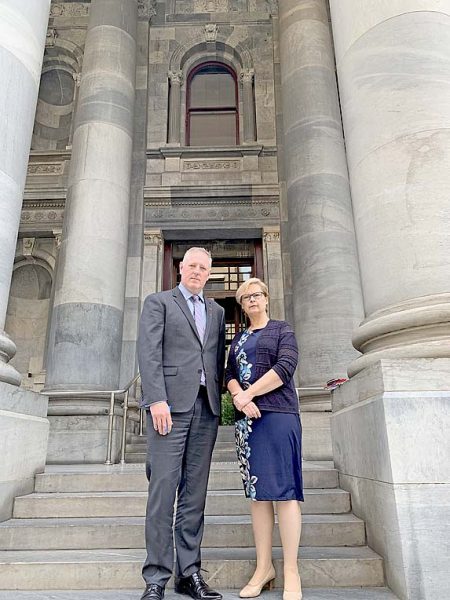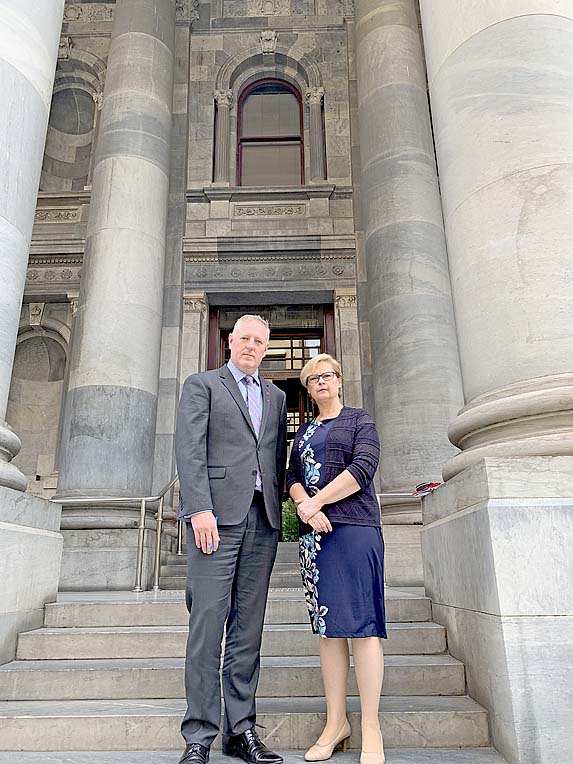
THE State Liberal Party has voted down Mount Gambier MP Troy Bell’s attempt to establish a parliamentary committee to examine the economic impact of wood fibre exports on the South East.
In a surprise move, the Independent’s multi-part motion was backed by State Labor in the state’s lower house of Parliament, with MLC Clare Scriven introducing a near-identical motion in the Legislative Council.
Mr Bell said he was disappointed with the Liberal Party’s decision, but welcomed Labor’s support for the bill.
He said the motion, which will look into export volumes of radiata pine log and the compliance of the conditions of the sale of ForestrySA’s harvesting rights, was not a “witch hunt”, but rather an attempt to look at potential benefits for the region and the timber industry if the “large volume” of exported wood fibre was retained locally.
“We are requesting that inquiry look into an issue directly affecting the future of the Limestone Coast timber industry – that local timber processors are missing out when it comes competing for log supply with the export market,” he said.
“There are hundreds of jobs that could be created in the Limestone Coast if exports of raw log were reduced or quotas were introduced.”
Mr Bell said he had been approached by three separate companies wanting to establish or expand operations but were “hamstrung” by a lack of additional wood fibre access.
He told the house timber shortages were also affecting other industries, including local vignerons, who he said were waiting up to 12 months for timber posts to grow and maintain their vineyards.
“Wood grown in the Limestone Coast should be available to Limestone Coast businesses first,” he said.
“Growing our economy should be the priority, not shipping off our product and jobs overseas.”
He said he welcomed the State Government’s announcement of an independent audit on the lease agreement with OneFortyOne plantations, but said it needed to be extended further to capture past practices.
“The company in question has also known for over 12 months the State Liberals went to the election promising an independent audit,” Mr Bell said.
“It is intriguing the announcement has come after the 12 months since the State election and the audit period is for the previous 12 months.
“Now a cynical assessment of this could be that this independent audit is so narrow in regard to time that past practices will not be examined.”
However, Regional Development Minister Tim Whetstone said the terms of reference in the motion were “so broad” as to include the operations of all forest growers, including to investigate commercial-in-confidence contracts with sawmills and other customers.
Speaking against the motion, Mr Whetstone said it was “broad, invasive and it is not required at this time”.
Mr Whetstone said the government was “already undertaking a number of positive measures” for the forestry industry to enable stronger collaboration.
He said attempts to constrict exports of timber resources “may have a negative and unintended consequence” and “disadvantage the South Australian forest business”.
“At a national forestry ministers meeting on June 1, 2018 , examples of other countries intervening in log exports were examined,” Mr Whetstone said.
“In every example, this intervention created a distortion in the market, resulting in negative, unforeseen local outcomes.
“At this meeting, it was agreed by all ministers that Australian and State Governments should generally not intervene in log export trade to avoid the distorting of the market.
Mr Whetstone acknowledged the concerns of the South Australian Timber Processors Association relating to exports, but said the government had no controls within its lease agreements regarding OneFortyOne’s sale of saw or pulp log.
He said the issue was further complicated by other sectors of the industry exporting products.
“Some of the small saw-millers themselves undertake minor processing which they themselves export instead of providing to local processors,” he said.
“They are building pallets, using that pulp log to make logistical products themselves, are exporting those products.
“There is a significant pallet shortage in SA.”








